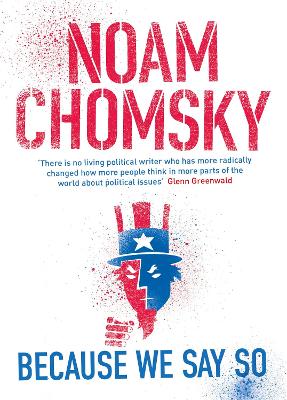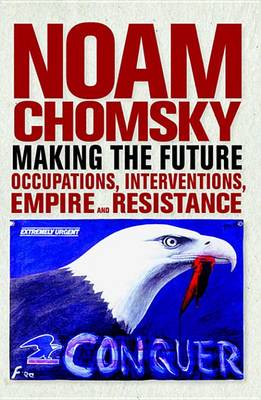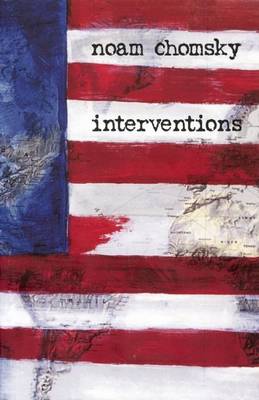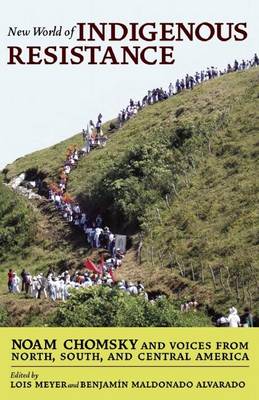City Lights Open Media
4 total works
Because We Say So is Noam Chomsky's essential counter punch to American hegemony.
In 1962, the eminent statesman Dean Acheson enunciated a principle that has dominated global politics ever since: that no legal issue arises when the United States responds to a challenge to its 'power, position, and prestige'. In short, whatever the world may think, U.S. actions are legitimate because they say so.
Spanning the impact of Edward Snowden's whistleblowing and Palestinian-Israeli relations to deeper reflections on political philosophy and the importance of a commons to democracy, Because We Say So takes American imperialism head on.
'Noam Chomsky is one of a small band of individuals fighting a whole industry. And that makes him not only brilliant, but heroic' Arundhati Roy
'The world's greatest public intellectual' Observer
In 1962, the eminent statesman Dean Acheson enunciated a principle that has dominated global politics ever since: that no legal issue arises when the United States responds to a challenge to its 'power, position, and prestige'. In short, whatever the world may think, U.S. actions are legitimate because they say so.
Spanning the impact of Edward Snowden's whistleblowing and Palestinian-Israeli relations to deeper reflections on political philosophy and the importance of a commons to democracy, Because We Say So takes American imperialism head on.
'Noam Chomsky is one of a small band of individuals fighting a whole industry. And that makes him not only brilliant, but heroic' Arundhati Roy
'The world's greatest public intellectual' Observer
Taken together, Chomsky's essays present a powerful counter-narrative to official accounts of the major political events of the past four years: the wars in Afghanistan and Iraq; the U.S. presidential race; the ascendancy of China; Latin America's leftward turn; the threat of nuclear proliferation in Iran and North Korea; Israel's invasion of Gaza and expansion of settlements in Jerusalem and the West Bank; developments in climate change; the world financial crisis; the Arab Spring; the assassination of Osama bin Laden; and the Occupy protests. Laced throughout his critiques are expressions of commitment to democracy and the power of popular struggles. "Progressive legislation and social welfare," writes Chomsky, "have been won by popular struggles, not gifts from above. Those struggles follow a cycle of success and setback. They must be waged every day, not just once every four years, always with the goal of creating a genuinely responsive democratic society, from the voting booth to the workplace." Making the Future is a follow-up to Interventions, published by City Lights in 2007 and banned from Guantanamo Bay by U.S. military censors.
Both books are drawn from articles Chomsky has been writing regularly for the New York Times Syndicate, but which go largely ignored by newspapers in the United States. Making the Future offers fierce, accessible, timely, gloves-off political writing by one of America's foremost intellectual and political dissidents. Making the Future presents more than fifty concise and persuasively argued commentaries on U.S. politics and policies, written between 2007 and 2011. "Unwavering political contrarian Noam Chomsky smart-bombs the U.S. military's global Interventions (City Lights). Shock and awe!"--Vanity Fair " ...he has emerged as one of the left's most implacable voices, challenging the often hidden structures that lie behind the abuse of power." --Paul V. Griffith, Chapter 16 "Making the Future is an impressive collection of articles shedding light on and challen- ging the current political, economic, and military world order. To make sense of the complex mechanisms at play, Chomsky adopts a fundamentally interdisciplinary approach: he juggles with history, sociology of the media, critical theory, and political philosophy."
--Juliana Bidadanure, Global Discourse, 2013 Noam Chomsky is a world-renowned author, linguist, and advocate for democracy. He is the critically acclaimed author of many books, including Hegemony or Survival, Imperial Ambitions, Failed States, Manufacturing Consent, and Media Control. He lives in Massachusetts where he is Institute Professor Emeritus in the Department of Linguistics and Philosophy at MIT.
Both books are drawn from articles Chomsky has been writing regularly for the New York Times Syndicate, but which go largely ignored by newspapers in the United States. Making the Future offers fierce, accessible, timely, gloves-off political writing by one of America's foremost intellectual and political dissidents. Making the Future presents more than fifty concise and persuasively argued commentaries on U.S. politics and policies, written between 2007 and 2011. "Unwavering political contrarian Noam Chomsky smart-bombs the U.S. military's global Interventions (City Lights). Shock and awe!"--Vanity Fair " ...he has emerged as one of the left's most implacable voices, challenging the often hidden structures that lie behind the abuse of power." --Paul V. Griffith, Chapter 16 "Making the Future is an impressive collection of articles shedding light on and challen- ging the current political, economic, and military world order. To make sense of the complex mechanisms at play, Chomsky adopts a fundamentally interdisciplinary approach: he juggles with history, sociology of the media, critical theory, and political philosophy."
--Juliana Bidadanure, Global Discourse, 2013 Noam Chomsky is a world-renowned author, linguist, and advocate for democracy. He is the critically acclaimed author of many books, including Hegemony or Survival, Imperial Ambitions, Failed States, Manufacturing Consent, and Media Control. He lives in Massachusetts where he is Institute Professor Emeritus in the Department of Linguistics and Philosophy at MIT.
Noam Chomsky says that the freedom to challenge power is not just an opportunity, it's a responsibility. For the past several years Chomsky has been writing essays for The New York Times Syndicate to do just that: challenge power and expose the global consequences of U.S. policy and military actions worldwide. Interventions is a collection of these essays, revised and updated with notes by the author. While Chomsky's New York Times Syndicate writings are widely published around the world, they have rarely been printed in major U.S. media; none have been published in the New York Times. Concise and fiercely argued, Interventions covers the invasion and occupation of Iraq, the Bush presidency, Israel and Palestine, national security, the escalating threat of nuclear warfare, and more. A powerful and accessible new book from one of America's foremost political intellectuals and dissidents. "Interventions offers over forty of Chomsky's columns; insightful, crisp and well-researched pieces on news events of the day. From 9-11 to the Iraq War, from the 'non-crisis' of social security to the leveling of Lebanon, Chomsky provides informed opinion and critical analysis."
-- Mumia Abu-Jamal "Chomsky is a global phenomenon ...perhaps the most widely read voice on foreign policy on the planet." -- New York Times Book Review "Unwavering political contrarian Noam Chomsky smart-bombs the U.S. military's global Interventions (City Lights). Shock and awe!" -- Vanity Fair "With relentless logic, Chomsky bids us to listen closely to what our leaders tell us--and to discern what they are leaving out...Agree with him or not, we lose out by not listening." -- Business Weekly Noam Chomsky has taught linguistics and philosophy at MIT for more than fifty years. He is a critically-acclaimed author of numerous books, including Hegemony or Survival, Imperial Ambitions, Failed States, Manufacturing Consent, and Media Control and Failed States.
-- Mumia Abu-Jamal "Chomsky is a global phenomenon ...perhaps the most widely read voice on foreign policy on the planet." -- New York Times Book Review "Unwavering political contrarian Noam Chomsky smart-bombs the U.S. military's global Interventions (City Lights). Shock and awe!" -- Vanity Fair "With relentless logic, Chomsky bids us to listen closely to what our leaders tell us--and to discern what they are leaving out...Agree with him or not, we lose out by not listening." -- Business Weekly Noam Chomsky has taught linguistics and philosophy at MIT for more than fifty years. He is a critically-acclaimed author of numerous books, including Hegemony or Survival, Imperial Ambitions, Failed States, Manufacturing Consent, and Media Control and Failed States.
Indigenous societies throughout Latin America are facing difficult choices. After centuries of colonization, the ongoing struggle to preserve communal knowledge, rituals, language, traditions, and teaching and learning practices has taken on even more significance in the increasingly standardized world of globalization. For many indigenous societies, protecting community-based customs has involved the rejection of state-provided education, raising a series of interconnected issues regarding autonomy, modernity and cultural sustainability. In New World of Indigenous Resistance, these questions are approached from multiple perspectives by means of an innovative exchange between linguist and human rights advocate Noam Chomsky, and more than twenty scholars, activists and educators from across the Americas. Two interviews with Chomsky open the exchange with lessons from world history, linguistics, economics and anti-authoritarian philosophy, parallel histories of peoples worldwide who have resisted state power while attempting to sustain or even revitalize community traditions.
In response to Chomsky's ideas, voices from Argentina, Bolivia, Ecuador, Guatemala, Mexico, Panama, Peru, the United States, and Uruguay dray from their first-hand experience and scholarship, speaking to, with, and at times against Chomsky's views. In a final interview Chomsky reflects upon the commentaries; the result is a nuanced intellectual and political exchange--a compelling conversation that offers a contemporary vision of indigenous resistance, survival and hope. "Two direct interviews with Chomsky enhance this articulate examination of challenges facing indigenous peoples today, including a positive viewpoint of means by which indigenous cultures can resist total assimilation, endure and spread hope. Highly recommended." --Midwest Book Review "The key issue facing indigenous peoples as they gain new rights and raise their profile within Latin America's newly democratic states is how to reconcile the cultural inheritance that makes them indigenous with forces that aim to tether them to national identities or unleash upon them the corrosive acculturation implied by globalization...This collection of commentaries -- framed by the wisdom of Noam Chomsky -- offers an excellent point of departure for the student interested in addressing such questions.
With a significant focus on education, the writers address the thorny yet timeless issue of how to reconcile the ancient with the modern...If there is one theme that emerges, it is of the potential for inter-communal co-operation and the concrete benefits diversity can bring to Latin American social life." --Gavin O'Toole, Latin American Review of Books "This book is unique, thought-provoking and inspiring. The voices included in this edited collection, most of them unheard in mainstream Western academia, not only denounce the crimes committed against Indigenous peoples, but also reflect decades of Indigenous struggle, resistance, hope and commitment...This book speaks to students, teachers, administrators and researchers from different disciplines and invites them to work together and follow the exemplary struggles of Indigenous peoples in different parts of America." -Teachers College Record
In response to Chomsky's ideas, voices from Argentina, Bolivia, Ecuador, Guatemala, Mexico, Panama, Peru, the United States, and Uruguay dray from their first-hand experience and scholarship, speaking to, with, and at times against Chomsky's views. In a final interview Chomsky reflects upon the commentaries; the result is a nuanced intellectual and political exchange--a compelling conversation that offers a contemporary vision of indigenous resistance, survival and hope. "Two direct interviews with Chomsky enhance this articulate examination of challenges facing indigenous peoples today, including a positive viewpoint of means by which indigenous cultures can resist total assimilation, endure and spread hope. Highly recommended." --Midwest Book Review "The key issue facing indigenous peoples as they gain new rights and raise their profile within Latin America's newly democratic states is how to reconcile the cultural inheritance that makes them indigenous with forces that aim to tether them to national identities or unleash upon them the corrosive acculturation implied by globalization...This collection of commentaries -- framed by the wisdom of Noam Chomsky -- offers an excellent point of departure for the student interested in addressing such questions.
With a significant focus on education, the writers address the thorny yet timeless issue of how to reconcile the ancient with the modern...If there is one theme that emerges, it is of the potential for inter-communal co-operation and the concrete benefits diversity can bring to Latin American social life." --Gavin O'Toole, Latin American Review of Books "This book is unique, thought-provoking and inspiring. The voices included in this edited collection, most of them unheard in mainstream Western academia, not only denounce the crimes committed against Indigenous peoples, but also reflect decades of Indigenous struggle, resistance, hope and commitment...This book speaks to students, teachers, administrators and researchers from different disciplines and invites them to work together and follow the exemplary struggles of Indigenous peoples in different parts of America." -Teachers College Record



